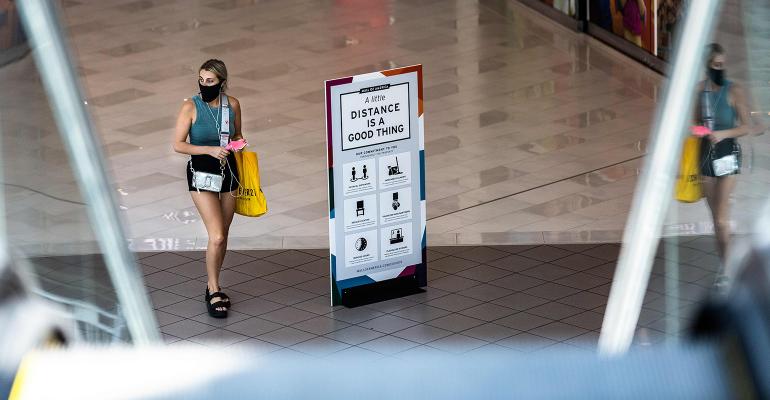(Bloomberg Opinion) -- The latest earnings season showed retailers of all stripes, not just e-commerce companies, have been winners in the pandemic.
Amazon.com Inc. is reaping a windfall, as are emerging e-commerce stars such as Wayfair Inc. and Etsy Inc. But physical giants such as Home Depot Inc. and Target Corp. and athleisure apparel company Lululemon Athletica Inc. have reported stellar earnings too.
This is partly because fiscal relief passed by Congress has supported household incomes despite the rise in unemployment. But it’s also because, as Target's CEO noted, consumer spending that would have gone to in-person activities such as travel or dining has gone into buying physical products instead.
The risk to these companies — and to investors who have sought refuge from the pandemic in their shares — is what happens once there's a vaccine and consumer spending shifts back to in-person activities. That normalization process will be good news for the economy overall but bad news for retailers that have benefited from this year's disruption.
So many retailers have thrived in the pandemic that we can think of them holistically in a behavioral sense, rather than just dividing them into traditional themes such as e-commerce or home improvement. Recreation vehicle sales are up as would-be travelers see them as safer than airplanes and hotels. Swimming pool makers have benefited as people try to relax at home. Yoga clothes and athleisure are in, while business suits are out, as work-from-home employees prioritize comfort over office attire.
For the most part, if you sell goods that still have utility while in-person gatherings are curtailed, if consumers believe it's safe to shop with you, and if you've had inventory to sell, then you're doing well.
This won’t last forever. There may be some permanent shifts here; in the case of e-commerce, perhaps customers who previously wouldn't have shopped online in a certain category may continue to shop that way going forward. But a lot of this shopping will prove temporary once life gets back to normal.
Consumers have fixed budgets, and a dollar spent on travel or dining is a dollar that can't be spent buying stuff online. And once you buy one RV or swimming pool you usually don't need another one.
Another factor beyond wallet share is time share. When it comes to social media or streaming services, it’s understood that a minute spent on Facebook is a minute not spent watching television or Netflix. There are only so many minutes in the day, and people have to sleep, work, eat, and live their lives. The same applies to shopping.
The pandemic has changed how we use our time. We can’t spend weekends with friends or family, or at restaurants or weddings, as much as usual. So it’s somewhat more appealing to go to a big-box store to get out of the house, or to spend more time shopping online, if only as a diversion. A Saturday morning not spent at brunch is a Saturday morning that can be spent shopping for outdoor furniture. That process will reverse after a vaccine.
There’s a limit to how much things can move in the opposite direction; most people won't eat twice as many steak dinners in 2021 to make up for lost time in 2020. But it's possible that, once it's safe to do so, people will spend much more time on in-person activities than usual for a while.
People may revel in doing things they previously took for granted. With two young kids, I'm already dreading the possibility of visiting a Disney theme park next year, knowing how many other families who didn't get their Disney pilgrimage this year will be fighting for the same reservations I will. Difficulties finding in-stock items or reserving a home contractor right now might be replaced by struggles to book restaurants and hotels a year from now.
This could be a rude awakening for investors in retail stocks that have provided a measure of security in 2020. It's possible, perhaps even likely, that the two-year performance of these companies in 2020 and 2021 will exceed what anyone could have reasonably expected at the end of 2019.
But from the standpoint of trends internalized by investors this year, performance next year could disappoint — particularly relative to companies involved in activities that have been suppressed in 2020 but could come back strong in 2021.
To contact the author of this story:
Conor Sen at [email protected]
To contact the editor responsible for this story:
Mark Gongloff at [email protected]





